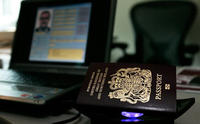-
DHS reducing reliance on contractors
The Obama administration has sought to reduce the government’s dependence on contractors that the Bush administration relied upon so heavily during the formation of DHS; DHS has reviewed approximately 100 service contracts to see which should be assigned to an internal department rather than an outside vendor; the contract review project will serve as a template for future evaluations of all the department’s approximately 10,000 service contracts
-
-
iPhone app helps police "see" through walls
Law enforcement officials are using SafetyNet Mobile, a powerful new iPhone app, to fight crime; the app allows police officers to quickly access all emergency dispatch information including maps, warnings, hazard information, and other critical data; to access the emergency dispatch database, the officer simply points the iPhone or iPad’s camera at a location; this technology allows police to “see” behind doors or walls by alerting them to any potential dangers inside; the app installs on any iPhone or iPad; SafetyNet Mobile has been successfully tested by three police departments in California and is currently being rolled out
-
-
Government IT contractors remain optimistic about future
Government services and information technology (IT) contractors remain optimistic about future growth; the defense industry still remains as “an $800 billion marketplace,” despite budget cuts and an increasing move by the federal government to insource contracts; IT firms are particularly positive about growth in key areas like cyber security, intelligence, and simulation; federal spending on cyber security is projected to reach $13.3 billion annually by 2015
-
-
China Looks to Invest in California's High Speed Rail
China looks to add California’s extensive high-speed rail project to its resume; with experience in rail projects both at home and throughout Asia, China can also bring financing to the table as well as project expertise
-
-
Questions about TSA's approach to security technology
The massive push to improve airport security in the United States after the attacks of 9/11 led to a gold rush in technology contracts for an industry that mushroomed almost overnight; since it was founded in 2001, the TSA has spent roughly $14 billion in more than 20,900 transactions with dozens of contractors; in addition to beefing up the fleets of X-ray machines and traditional security systems at airports nationwide, about $8 billion also paid for ambitious new technologies; critics question whether TSA was too eager to look for technological solutions to basic security problem, and willing to write checks for unproven products
-
-
BAE Systems prime IT vendor for the FBI's largest-ever IDIQ
BAE Systems was selected as the prime IT vendor for the FBI’s largest ever IDIQ (Indefinite Delivery/Indefinite Quantity) contract, potentially valued as high as $30 billion; the 8-year effort covers a variety of services, including hardware/software and related services, operations and maintenance, technical and development
-
-
DHS gives itself 30 days to decide SBInet fate
DHS has given Boeing a temporary 30-day extension on the troubled SBInet border virtual fence contract; DHS has spent $1.1 billion over three years on the ambitious project, without much to show for it; “one insider says: the question is whether to carry on with a Cadillac version of the network—- or to exchange it for a Chevy model that gets the job done faster”
-
-
Vehicle escape windows increase soldiers' safety
BAE receives a $70 million contract to install Vehicle Emergency Escape (VEE) Windows to more than 39,000 U.S. Army vehicle, with more than 16,000 kits already shipped; the patent pending system features a simple, intuitive design that enables soldiers quickly to exit the vehicle in case of an emergency
-
-
New UAV to loiter the sky for five years without landing
Boeing has been given $89 million to build Vulture — a large solar-powered UAV intended to cruise the stratosphere for five years without landing; the idea is to achieve a platform which combines the good qualities of both satellites and aircraft with none of the downsides of either
-
-
1st Detect in $735,000 contract for chemical detection in the field
Phase II SBIR contract from the Joint Science & Technology Office for Chemical and Biological Defense will allow the company to design and develop a novel sample inlet system intended to improve the sensitivity of mass spectrometers used for chemical detection in the field
-
-
DHS seeking unattended sensors technology for border surveillance
DHS is seeking information from companies who can build unattended ground sensors that can detect and locate people, boats, or vehicles moving along rivers, roads, and paths in dense forests; DHS says it needs this capability for border surveillance to monitor those entering the United States illegally in rough terrain
-
-
TSA denies Unisys' ITIP contract bid, reaffirms selection of CSC
Unisys filed a protest with the Government Accountability Office (GAO) over the awarding the TSA’s Information Technology Infrastructure Program (ITIP) contract to Computer Sciences Corp. (CSC); the ITIP award has been worth over $1 billion to Unisys and going forward was valued at $500 million over five years to run TSA’s information technology infrastructure; the 2-year long battle is now over, with TSA denying Unisys’s bid and saying CSC will restart the contract 1 September
-
-
U.K. removes lead contractor Raytheon from e-Borders program

The U.K. hits out at Raytheon, removing the company from the £1.2 billion e-Borders program; the immigration minister Damian Green said earlier today that the program was running at least twelve months late and that Raytheon had been in breach of contract since July last year; Home Office says it has “no confidence” in the company; Raytheon was the lead contractor of the Trusted Borders consortium, which won a £650 million deal in 2007 to build the e-Borders system; other members of the consortium, including Serco, Detica, Accenture, and Qinetiq will keep their contracts; Raytheon was responsible for systems integration, travel services, and overall project management
-
-
DHS IG: flawed assumptions about technology, poor contractor oversight plague SBInet

DHS’s inspector general says the trouble-plagued SBInet program rested on faulty assumptions about technology — assumptions which led both to technology failures and inadequate monitoring by DHS; the SBI program officials stated that the initial assumption that commercial off-the-shelf technology would be available to cover SBInet needs, serving as a basis for determining staffing requirements, ultimately proved to be wrong”; also, officials failed to ensure that one milestone was properly completed before progressing to the next phase, increasing the risk of significant rework and associated project delays; the future of SBInet is unclear, as earlier this year DHS secretary Janet Napolitano froze spending and ordered an assessment of the program to determine if it should continue
-
-
Coast Guard solicits private sector ideas on how to stem spill, deal with consequences
“We’re adapting to an enemy that changes,” Coast Guard Adm. Thad Allen, the national incident commander for the oil spill, said; accordingly, in somewhat of an about-face, the Coast Guard last Friday began to solicit ideas from vendors, scientists, government laboratories, and nonprofits on how to stop, contain, and clean up the largest off-shore oil spill in U.S. history
-
- All
- Regional
- Water
- Biometrics
- Borders/Immig
- Business
- Cybersecurity
- Detection
- Disasters
- Government
- Infrastructure
- International
- Public health
- Public Safety
- Communication interoperabillity
- Emergency services
- Emergency medical services
- Fire
- First response
- IEDs
- Law Enforcement
- Law Enforcement Technology
- Military technology
- Nonlethal weapons
- Nuclear weapons
- Personal protection equipment
- Police
- Notification /alert systems
- Situational awareness
- Weapons systems
- Sci-Tech
- Sector Reports
- Surveillance
- Transportation
Advertising & Marketing: advertise@newswirepubs.com
Editorial: editor@newswirepubs.com
General: info@newswirepubs.com
2010-2011 © News Wire Publications, LLC News Wire Publications, LLC
220 Old Country Road | Suite 200 | Mineola | New York | 11501
Permissions and Policies
Editorial: editor@newswirepubs.com
General: info@newswirepubs.com
2010-2011 © News Wire Publications, LLC News Wire Publications, LLC
220 Old Country Road | Suite 200 | Mineola | New York | 11501
Permissions and Policies
